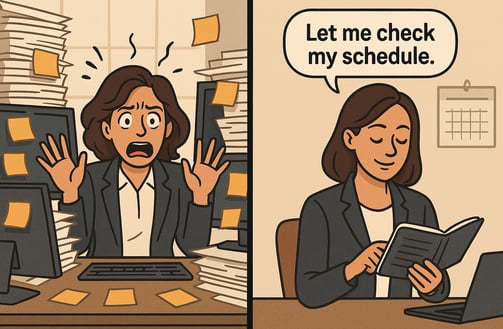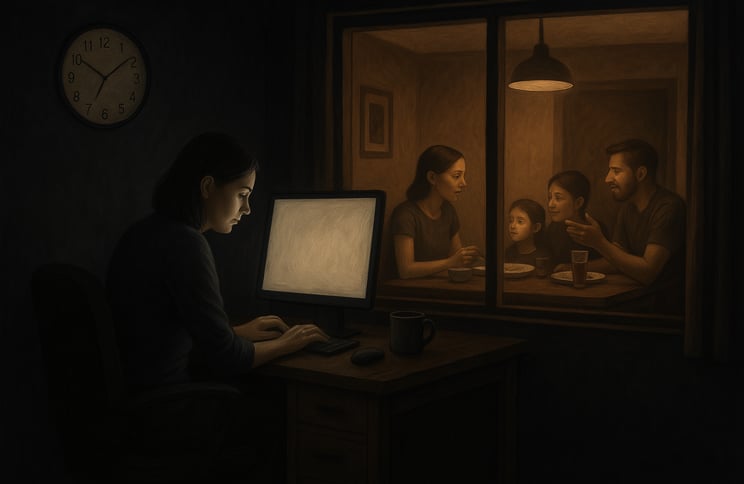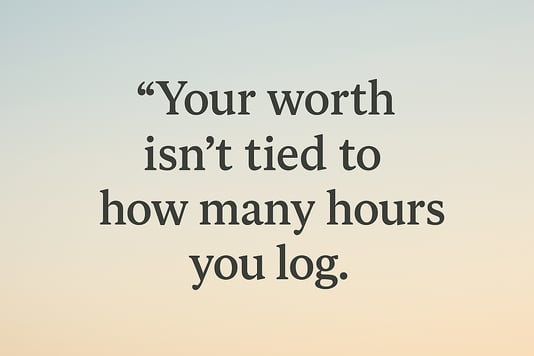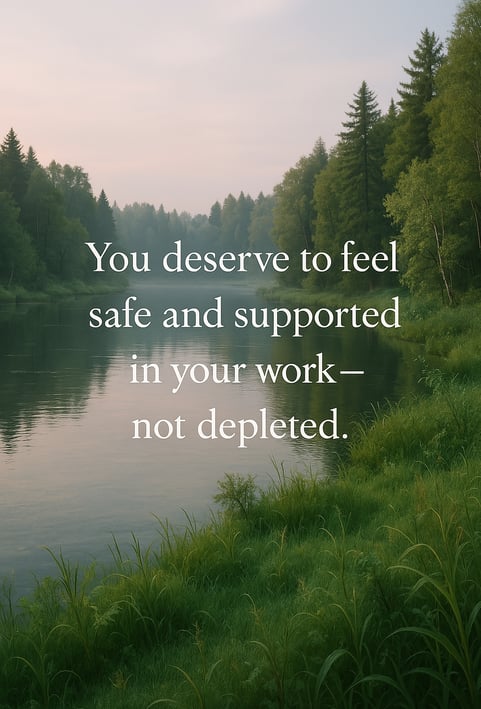Discover wellness ebooks at special prices!
Recognizing Toxic Workplace Culture: 5 Habits to Change | Feeling depleted by your job
Are you feeling depleted by your job? It might be time to question the 'normal' habits that signify toxic workplace culture. Discover 5 common signs of dedication that can harm your well-being, along with compassionate strategies to transform your work life.
6/29/202513 min read


Hey beautiful soul,
I'm writing this from my kitchen table on a Sunday morning, with my coffee getting cold because I keep pausing to think about you. About all the times you've probably felt that familiar weight in your chest before work. About how you might be reading this right now, wondering if what you're experiencing is "just how work is supposed to feel."
Let me start by saying something I wish someone had told me years ago: that knot in your stomach isn't normal. That Sunday evening dread isn't something you just have to live with. And that voice in your head saying you're "too sensitive" or "not tough enough"? It's lying to you.
I spent nearly a decade thinking I was the problem. I thought I just wasn't cut out for the "real world." I thought everyone else had some secret manual for handling workplace stress that I'd somehow missed. But here's what I've learned: some of the most toxic workplace habits are so normalized, so deeply embedded in our work culture, that we don't even recognize them as toxic anymore.
We've been conditioned to wear exhaustion like a badge of honor, to treat burnout as a rite of passage, and to mistake overwork for dedication. But sweet friend, there's a difference between being challenged at work and being slowly drained of your life force. There's a difference between having demanding days and living in a constant state of fight-or-flight.
I want to share five habits that I thought were just "part of being professional" until they nearly destroyed my health, my relationships, and my sense of self. More importantly, I want to share what I've learned about breaking free from them. Because you deserve to love your life—not just endure it.
1. The People-Pleasing Trap: Saying Yes When Your Body is Screaming No
My Story: For three years, I was the office "yes person." New project with an impossible deadline? "I've got it!" Extra presentation to prepare over the weekend? "No problem!" Cover someone else's shift while dealing with my own full workload? "Of course, I'm a team player!"
I thought I was being helpful, valuable, indispensable. What I was actually doing was teaching everyone around me that my time, energy, and well-being were infinitely flexible while theirs were not. I was training people to expect me to carry more than my fair share because I was too afraid to disappoint anyone.
The breaking point came when I said yes to leading a major project while already managing four others. I spent three weeks sleeping four hours a night, living on energy drinks and anxiety. I missed my nephew's birthday party because I was "too busy." I snapped at my partner for asking how my day went because I was too overwhelmed to even think about it.
That's when I realized: saying yes to everything meant saying no to myself, to my health, to the people who actually mattered in my life.
The Reality Check: Here's what nobody tells you about chronic people-pleasing at work: it doesn't actually make you more valuable—it makes you more vulnerable. When you never say no, your yes becomes meaningless. People start to expect your availability, your flexibility, your willingness to sacrifice your own needs. You become the person they call when they need someone to dump extra work on, not the person they promote or respect.
Your Action Plan:
Start Small: You don't have to become a boundary-setting warrior overnight. Start by adding a pause before you respond to requests. Try phrases like:
"Let me check my current commitments and get back to you"
"I want to give this the attention it deserves—can I review my schedule first?"
"That sounds important. Help me understand the timeline so I can see how it fits with my existing priorities"
Practice the Graceful No: When you do need to decline, try these approaches:
"I wish I could help with this, but I'm at capacity with [specific project]. Could we discuss timeline options?"
"This isn't something I can take on right now, but have you considered [alternative solution]?"
"I'm not available for this, but I'd be happy to help you think through who might be a good fit"
Document Your Workload: Keep a running list of your current projects and commitments. This isn't about being defensive—it's about having clarity on your actual capacity. You can't make good decisions about what to take on if you don't have a clear picture of what you're already handling.
Set Office Hours for Availability: Decide when you're available for "extra" requests and when you're not. Maybe you're open to new projects on Tuesdays but not on Fridays when you're trying to wrap up the week.
2. The Lunch Break Lie: When "Just a Quick Bite at Your Desk" Becomes Your Life.
My Story: I still remember the day I realized I hadn't eaten a proper lunch away from my computer in over a month. I was mindlessly shoving a sandwich in my mouth while responding to emails, crumbs falling onto my keyboard, barely tasting the food. I told myself I was being "efficient," that I was "getting ahead."
What I was actually doing was training my nervous system to never fully relax. I was teaching my body that there was never a safe time to rest, never a moment when I could step away from the constant state of vigilance that work demands.
The worst part? I was proud of this. I wore my "I'm too busy to take lunch" badge like it proved how dedicated I was. I looked down on colleagues who actually left the building for lunch, thinking they weren't as committed as I was.
It took a complete breakdown—panic attacks that started hitting me around 2 PM every day—for me to realize that never giving my brain a break was literally making me sick.
The Reality Check: Your brain isn't designed to focus intensely for eight straight hours. When you skip real breaks, you're not being more productive—you're running your mental engine into the ground. That afternoon brain fog, the irritability, the feeling like you're moving through molasses by 3 PM? That's not normal. That's your brain begging for a reset.
Studies show that people who take regular breaks are actually more creative, make better decisions, and get more done than those who try to power through. But beyond the productivity argument, here's what matters more: you're a human being, not a machine. You deserve to eat your food mindfully, to feel sunlight on your face, to have moments in your day that belong entirely to you.
Your Action Plan:
Start With Micro-Breaks: If taking a full lunch break feels impossible right now, start with 5-10 minute breaks every hour. Set a gentle timer on your phone. Stand up, stretch, look out a window, take five deep breaths.
Make Lunch Sacred: Pick one day this week and commit to eating lunch away from your desk. It doesn't have to be a hour-long break. Even 20 minutes in a break room, outside, or in your car can reset your entire system.
Create a Break Ritual: Make your breaks intentional. Maybe it's brewing a proper cup of tea and drinking it while looking out the window. Maybe it's a quick walk around the building. Maybe it's five minutes of deep breathing in a quiet space. The key is doing something that signals to your nervous system: "You can relax now."
Protect Your Lunch Time: Stop scheduling meetings during lunch. Put "lunch" on your calendar like it's an important appointment (because it is). If someone tries to book you during lunch, suggest alternative times.
Practice Mindful Eating: When you do eat, try to actually taste your food. Put your phone away. Chew slowly. This isn't just about nutrition—it's about giving your brain a complete break from work mode.
3. The Overtime Obsession: When "Going Above and Beyond" Becomes Going Under.
My Story: I used to take perverse pride in being the last person to log off Slack every night. I'd see those "last seen" timestamps and feel superior to colleagues who had signed off at reasonable hours. I thought their 6 PM departures meant they weren't as dedicated as I was with my 9 PM work sessions.
I convinced myself that working nights and weekends was temporary—just until I got ahead, just until I proved myself, just until things calmed down. But "temporary" turned into two years. Two years of eating dinner at my computer, of bringing my laptop on every vacation, of checking emails in bed.
The wake-up call came when my partner said, "I feel like I'm in a relationship with your job, not with you." That hit harder than any performance review ever could.
The Reality Check: Here's the uncomfortable truth about chronic overwork: it's often a sign of poor systems, unclear priorities, or boundary issues—not dedication. When you consistently need to work extra hours to keep up, something is broken. Either you're taking on too much, the expectations are unrealistic, or the workflow needs to be redesigned.
More importantly, your worth as a human being has nothing to do with how many hours you log. Your value isn't measured in late-night emails or weekend work sessions. You are worthy of rest, of relationships, of a life outside of your job title.
Your Action Plan:
Audit Your Actual Work Hours: For one week, track exactly how much time you're spending on work—including checking emails at home, thinking about work problems, and weekend tasks. You might be shocked by the real number.
Identify Your Peak Hours: Notice when you do your best work. Are you sharp in the morning but useless after 6 PM? Protect your peak hours for your most important tasks instead of spreading your energy thin across 12-hour days.
Create a Shutdown Ritual: Develop a clear end-of-workday routine. Maybe it's reviewing tomorrow's priorities, tidying your workspace, and then physically closing your laptop. This signals to your brain that work time is over.
Set Communication Boundaries: Decide when you will and won't respond to work communications. Maybe you don't check email after 7 PM or on Sundays. Communicate these boundaries clearly to your team.
Practice Saying "This Can Wait": Before working late on something, ask yourself: "What would happen if this waited until tomorrow?" Often, the answer is: absolutely nothing significant.
4. The Silent Treatment: When You Swallow Your Voice to Keep the Peace.
My Story: I spent years watching a colleague interrupt me in every single meeting. Every time I'd start to share an idea, he'd jump in with "Actually..." or "What Sarah means is..." He'd literally finish my sentences, often getting credit for ideas I'd started to express.
And what did I do? I told myself maybe I was talking too much. Maybe I wasn't being clear enough. Maybe I needed to be more assertive (but not too assertive, because then I'd be "difficult"). I spent so much energy analyzing my own behavior that I never addressed his.
The knot in my chest grew tighter every week. I started dreading meetings, second-guessing everything I wanted to say. I was so focused on not making waves that I forgot I had a right to speak up for myself.
The Reality Check: Staying silent when you're being treated unfairly doesn't make you a good employee—it makes you complicit in your own mistreatment. When you don't advocate for yourself, you're teaching people that your voice doesn't matter, that your contributions are optional, that your comfort is less important than everyone else's.
But here's what I wish I'd known: speaking up doesn't have to mean creating drama or being confrontational. It can be calm, professional, and firm. You can advocate for yourself while still being kind.
Your Action Plan:
Start With Small Advocacy: Practice speaking up in low-stakes situations first. If someone cuts in front of you in the coffee line, politely say, "Excuse me, I think I was next." Build your confidence with small moments.
Use the Redirect Technique: When someone interrupts you, try: "I wasn't finished with my thought. As I was saying..." or "Let me finish my point, and then I'd love to hear your perspective."
Document Patterns: If someone consistently undermines you, keep notes. Date, time, what happened, who was present. This isn't about building a case against them—it's about validating your own experience and having facts if you need to escalate.
Find Your Allies: Identify colleagues who respect you and would support you if needed. Sometimes just knowing you're not alone gives you the courage to speak up.
Practice Your Phrases: Have a few go-to responses ready:
"I need you to stop interrupting me"
"That's not accurate, and here's why..."
"I don't agree with that approach, and I'd like to suggest an alternative"
"I'm not comfortable with how this conversation is going"
5. The Burnout Badge: When Exhaustion Becomes Your Identity
My Story: I wore my exhaustion like armor. I bragged about how tired I was, how busy I was, how much I had going on. I thought it made me seem important, valuable, necessary. I mistook chaos for productivity and burnout for success.
I ignored every warning sign my body gave me. The headaches that started every Sunday evening. The insomnia that had me staring at the ceiling at 3 AM, mind racing with work problems. The constant low-level anxiety that made my shoulders live permanently up around my ears.
I told myself this was just what adulting looked like, what having a "real job" meant. I compared myself to other seemingly successful people who also looked exhausted and thought, "See? This is normal."
It wasn't until I literally collapsed at my desk—full panic attack, couldn't breathe, had to be sent home—that I realized something was very, very wrong.
The Reality Check: Chronic exhaustion isn't a personality trait—it's a symptom. Constant anxiety isn't just part of having a job—it's your nervous system telling you something needs to change. Your body is incredibly wise, and it's been trying to get your attention.
When you're chronically stressed, your body produces cortisol and adrenaline constantly. This is meant to be a short-term survival response, not a way of life. Living in constant fight-or-flight mode affects everything: your sleep, your digestion, your immune system, your ability to think clearly, your relationships.
You deserve to feel energized by your work, not depleted by it. You deserve to go to bed feeling satisfied with your day, not anxious about tomorrow. You deserve to have energy left over for the people and activities you love.
Your Action Plan:
Listen to Your Body's Whispers: Start paying attention to physical symptoms. Headaches, tight shoulders, stomach issues, sleep problems—these aren't just "stress" you have to live with. They're your body asking for help.
Create Non-Negotiable Self-Care: Identify 2-3 things that genuinely restore your energy. Maybe it's a morning walk, a weekly yoga class, or 20 minutes of reading before bed. Protect these like important meetings.
Practice Saying "I'm Managing My Energy": Instead of always saying "I'm so busy" or "I'm exhausted," try "I'm being thoughtful about how I spend my energy" or "I'm prioritizing my well-being."
Seek Professional Support: If you're experiencing chronic anxiety, depression, or physical symptoms, please talk to a healthcare provider. There's no shame in getting help—there's only wisdom in recognizing when you need support.
Remember: You Are Not Your Job: Write down 5-10 things about yourself that have nothing to do with work. Your sense of humor, your kindness to animals, your ability to make people feel comfortable, your love of terrible reality TV. You are a whole, complex, valuable human being outside of your job title.
The Path Forward: Redefining What "Professional" Really Means
Sweet friend, if you've recognized yourself in any of these stories, please know that you're not broken, and you're not weak. You've been operating in a system that profits from your overwork, that benefits when you don't advocate for yourself, that thrives when you mistake exhaustion for dedication.
But here's the beautiful truth: you get to choose differently. You get to redefine what professionalism means to you. You get to decide that being professional means:
Respecting your own time and energy
Communicating your needs clearly and kindly
Doing excellent work within reasonable boundaries
Taking care of your physical and mental health
Speaking up when something isn't right
Leaving work at work so you can be present in your life
Small Steps, Big Changes
You don't have to overhaul your entire work life overnight. Change happens in small, consistent steps. Maybe this week, you commit to taking one real lunch break. Maybe you practice saying "let me get back to you" before automatically saying yes to a request. Maybe you turn off work notifications after 8 PM just one night this week.
Each small boundary you set, each time you choose your well-being over someone else's convenience, each moment you remember that you are worthy of respect and care—these add up. They compound. They create a new normal that serves you instead of depleting you.
You Deserve Better
I'm writing this because I want you to know that the way you might be feeling right now—exhausted, overwhelmed, wondering if this is just how life has to be—isn't permanent. It's not a character flaw, and it's not your fault.
You deserve to wake up in the morning without that immediate weight of dread. You deserve to have energy for the people you love. You deserve to feel proud of your work without sacrificing your health. You deserve to be treated with respect and to respect yourself enough to expect it.
The world needs what you have to offer, but it needs the whole, healthy, rested version of you. Not the burned-out, people-pleasing, exhausted version that's been trying so hard to prove your worth.
Your worth isn't up for debate. Your well-being isn't negotiable. Your voice matters. Your boundaries matter. You matter.
I'm so proud of you for reading this far. That tells me you're ready to choose yourself, maybe for the first time in a long time. That takes incredible courage.
You've got this, and more importantly, you've got you. It's time to start treating that beautiful, resilient, worthy person with the kindness and respect they deserve.
With so much love and belief in you,
Your Big Sister
P.S. - Change takes time, and some days will be harder than others. That's okay. Be gentle with yourself as you learn new ways of being. You're not just changing habits—you're changing a whole mindset. That's brave, important work. I'm cheering you on every step of the way.
















